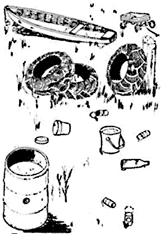|
|
 |
||||||||||
|
|||||||||||
|
|||||||||||
Way DownstreamIn Coastal Maryland, the effects of global warming are being felt swiftly and dramatically. The acreage of Bay grass in Maryland’s coastal bays dropped by nearly 4,000 acres over the past two years. In Maryland and Virginia combined, the loss was 10,548 acres — a 38 percent decline, according to a new report from the Virginia Institute of Marine Sciences. Eelgrass was the biggest victim, and its loss attributed mainly to rising water temperature …
In Chesapeake Country, a dry, cool spring staved off mosquito breeding until last week’s nor’easter brought rain and high tides. Wet conditions and warming temperatures means that mosquitoes have been encouraged to lay their eggs. Adults will emerge starting next week. State larvicide sprayers began working the first of May to hold down the pests. Keep skeeters from breeding on your property by removing rainwater collectors like buckets and pots, tarps, clearing clogged roof gutters, covering open rain barrels and disposing of old tires. In garden ponds, koi or Japanese fantails will gulp down larvae like fish food … Statewide, creepy-crawly tent caterpillars have been spinning their cotton-like tents in branches and crotches of trees. The native insect — which eats early leaves of trees and shrubs, usually early enough for the plant to recoup — came back this spring in abundance, according to word-of-mouth reports to the Department of Agriculture. The state doesn’t count or mass-spray for these caterpillars, which spin a cocoon in June and emerge as moths. At home, Bt on sprayed on the leaves in April, when juveniles chomp new foliage, can keep plants looking good … In Virginia, Earth Times reports that they might have found what we’re looking for: technology that removes nitrogen and other harmful nutrients from water and converts them into a safe fertilizer. The technology was tested from last fall into this spring at a wastewater treatment plant in Suffolk, on the James River, which flows into Chesapeake Bay. A Canadian company, Ostara Nutrient Recovery, says its process reduces harmful wastes and gives communities a product to sell …
From Jamestown, new Settlement of Jamestown postal stamp reminds the nation to celebrate the 400th anniversary of America’s first permanent English settlement in 1607. The 41-cent stamp framed in a bold blue bears a 1949 painting by Griffith Baily Coale, featuring the three billowing, double-masted sailing ships — Susan Constant, Godspeed and Discovery — that traversed the ocean. Puffy clouds frame a British flag. The stamp’s triangular shape reflects a fort erected by the wary settlers. Add history to your letters — just in time for the two-cent postal rate increase on May 14 … Our Creature Feature comes from Western Maryland, where a lot of bears are dying, and not all at the hands of hunters. Maryland’s Department of Natural Resources reported that a record 69 black bears died in Maryland in 2006 from causes other than legal hunting. In 1993, just nine bears were counted in the category of nonhunting mortality. Some of the bears were shot illegally, but many died on highways and some were hit by trains. Washington County in Western Maryland reported 13 dead bears, more than half on highways. As a result of the wave of bear deaths, DNR is planning to place highway signs at bear hot spots. |
|||||||||||
|
|||||||||||
|
|
|||||||||||
|
© COPYRIGHT 2007 by New Bay Enterprises, Inc. All rights reserved.
|
|||||||||||

